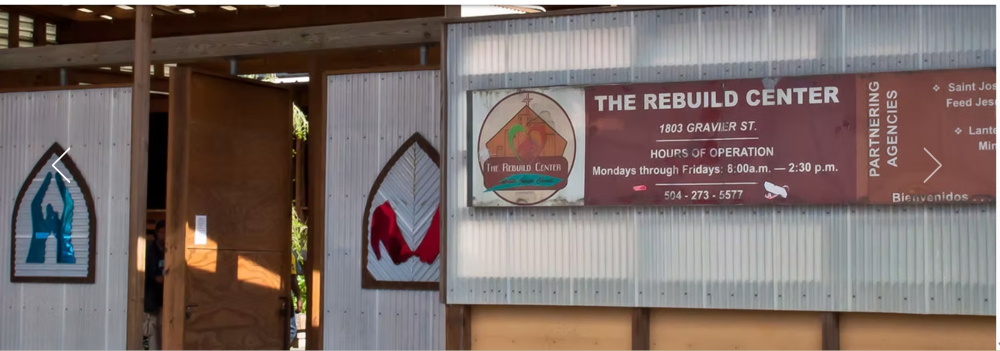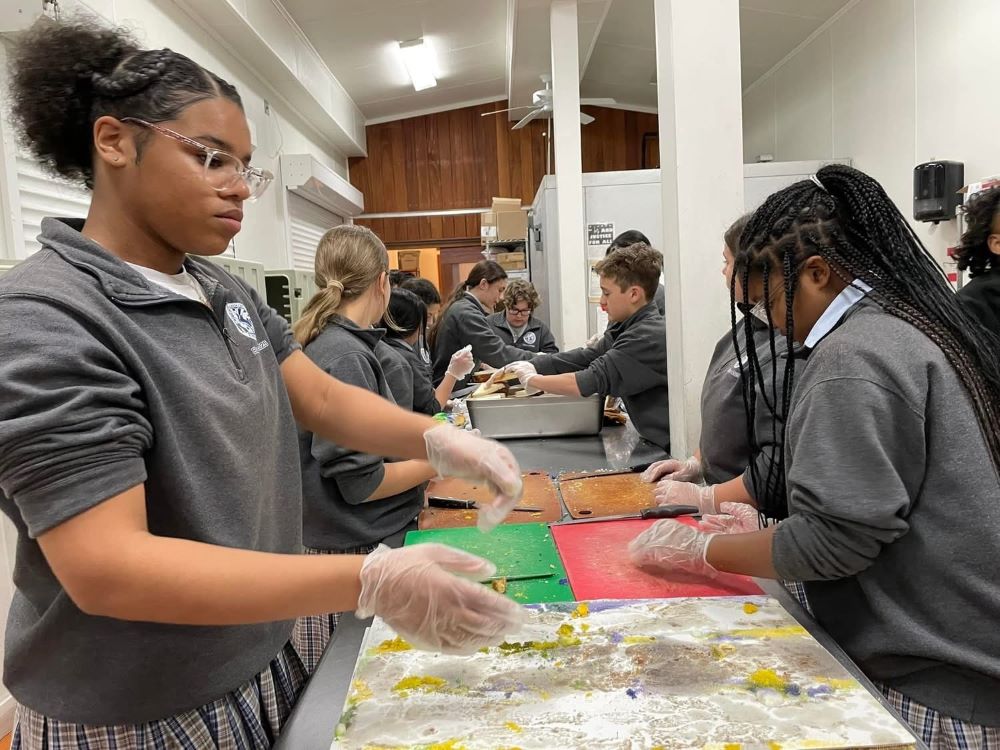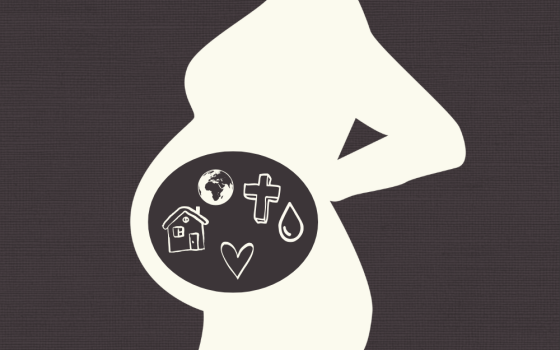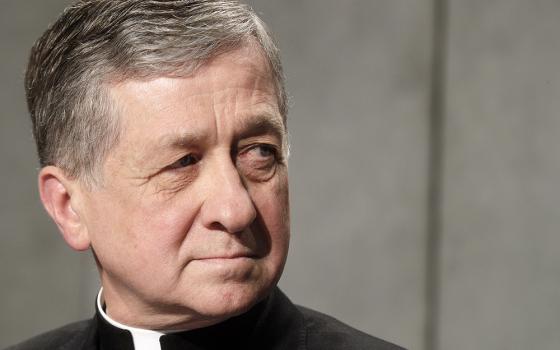Sr. Vera Butler, a Sister of the Presentation of the Blessed Virgin Mary, talks with a resident just returning to his New Orleans neighborhood six months after Hurricane Katrina. The Aug. 29, 2005, storm caused more than 1,392 deaths and caused untold damage in the Gulf Coast, particularly in New Orleans. (CNS/Nancy Wiechec)
Today is the 20th anniversary of Hurricane Katrina's landfall.
The devastating storm that struck the Gulf Coast Aug. 29, 2005, caused more than 1,392 deaths and untold damage, particularly in New Orleans. But it also marked the start of a new ministry for a handful of women religious that continues to this day.
As a reporter then with Catholic News Service, I spent an afternoon with these sisters, along with our photo editor, Nancy Wiechec. This was six months after Katrina, when these women were just getting started finding out what their community needed and how they could help.
For Sr. Vera Butler, the post-Katrina work was a continuation of what she already had been doing — helping those in need around St. Joseph's Church in New Orleans.
Prior to the storm and the massive levee breaks that left 80% of New Orleans underwater, Butler and her fellow sisters fled their New Orleans home. When they returned weeks later, the first floor was under 4 feet of water and a rowboat filled with water and random items was sitting in the backyard — left by someone who had found refuge in their home through an upstairs window.
Mardi Gras beads hang outside a vacant house in the Mid-City section of New Orleans in March 2006. The markings on the wall were made by search teams following Hurricane Katrina. (CNS/Nancy Wiechec)
The parish basement was also flooded. That's where Butler, a Sister of the Presentation of the Blessed Virgin Mary, had been running a ministry for eight years serving lunch to the homeless each day.
Needing a new place to work, the Irish nun set up shop in an un-airconditioned trailer in the church parking lot with four other Presentation sisters who only recently arrived to help her. At first, they gave out bottled water, buckets, bleach and cleaning supplies to people beginning the grueling work of cleaning out their flood-damaged homes.
Months later the sisters shifted gears to help people rebuild, linking residents with plumbers or electricians or helping with FEMA or insurance forms. Lines formed outside their trailer first thing in the morning and calls continued throughout the day.
Some came to them for food, others were looking for a place to live; some just needed money for clothes or a haircut before a job interview, or help writing a resume.
Almost daily, at first while living with another woman religious about an hour away, the sisters made rounds by car or walking in the Tulane-Canal Street neighborhood. People slowly returning to the city knew the sisters by name, and the sisters were quick to learn the names of those just arriving looking for work.
People affected by Hurricane Katrina walk on the elevated freeway in the aftermath of the storm in New Orleans Aug. 31, 2005. This year marks the 20th anniversary of the deadly storm. (OSV News/Reuters/Rick Wilking)
These white-haired women religious, from Ireland, Canada, Iowa and New York, walked the streets — lined with houses marked with red spray paint from search teams — with ease. They chatted with those outside, just days after a subdued Mardi Gras, asking if people needed anything. The sisters were both practical and kind, like well-needed friends encouraging people to rebuild amid such overwhelming devastation.
Walking along with two of them, I was convinced the church here got it right about truly being present to those in need.
One woman, getting help from the sisters to fix her home, told me how a neighbor got her onto planks of wood after the hurricane and pushed her to the interstate where she walked to the Superdome — a shelter for thousands in the city after the levees burst.
The 74-year-old widow at the time said when she came back to her neighborhood, Sister Vera, as everyone calls her, was the first person she saw. "They're my life now; they've saved my life," she said of the sisters.

The Rebuild Center at St. Joseph Church, New Orleans, is a collaborative ministry of organizations that include the Sisters of the Presentation of the Blessed Virgin Mary. It operates under the umbrella of Lantern Light Ministries. (NCR screenshot)
I spoke with Butler, now 80, on Aug. 27, just two days before Katrina's 20th anniversary. She has lived in San Antonio for the past nine years with members of her congregation, teaching English to immigrants studying for their GED certificates. As she spoke over the phone while at the airport, it sounded as if New Orleans, where she lived and worked for more than 30 years, was where she really wanted to be.
"My heart is still there," she said, her lilting Irish brogue cracking slightly when she said she wished she could go back.
Butler spoke fondly of the people of New Orleans, particularly those who endured the epic storm and then somehow found a new way forward.
"It's just their resilience, their sense of gratitude," Butler said. Many people in the community, even if they had little or nothing, were willing to share what they had and care for each other, she said,
Sr Vera Butler, pictured in 2006 (CNS/Nancy Wiechec)
She's also pleased that the work she and the other sisters started continues on a much broader scale with the Rebuild Center at St. Joseph Church — a collaborative effort of the Presentation Sisters, the Vincentians, St. Joseph Church, the Jesuits, Immaculate Conception Church and the Hispanic Apostolate of the Archdiocese of New Orleans under the umbrella of Lantern Light Ministries.
Butler serves on the board of the center, dedicated in 2007, which provides breakfast and lunch, health screenings, showers, bathrooms, a laundry room, a large meeting room and office spaces, pro bono legal services particularly for identification documents, help with job searches and a mail service for those with no mailing address.
Prior to the center's opening, Butler told the Clarion Herald, the former archdiocesan newspaper of New Orleans, that this expanded ministry "would never have come about without Katrina," referring to the work the sisters started then in response to so many needs. "Things will never be the same again, but I think things can be better," she said.

Seventh-grade students from Immaculate Conception School in Marrero prepare lunches at the St. Joseph Rebuild Center in New Orleans. Services at the center include breakfast and lunch, health screenings, showers, bathrooms, a laundry room and pro bono legal services. (Immaculate Conception School)
Kenitha Grooms-Williams, executive director of Lantern Light Ministries, is motivated by some of that same optimism. She started working with the sisters at St. Joseph's as a volunteer in 2009. After she earned her master's degree in social work, the sisters asked her to run the organization, which she views as part of her life's purpose.
"It's a ministry," she told me, but she also stressed that "it's a challenge every day," particularly in scrambling for funds to help the growing number of people in need.
Grooms-Williams, from New Orleans, stayed with family members in Louisiana during and right after Katrina. As she sees it, the region still has not completely recovered from the flooding, particularly its young people, dubbed "Katrina babies," who have experienced so many mental health issues.
"Twenty years later people are still suffering; that is heartbreaking," she said.
Advertisement
The sisters left their mark, Grooms-Williams said, but the needs only continue to grow with limited affordable housing, potential cuts to Medicaid, lack of wage increases and challenges in health and education.
"There is still a lot to do," she said, emphasizing "a lot." But almost without pause, she also reflected the same spirit of the sisters who greeted those who returned to New Orleans after Katrina's waters subsided.
"But there is hope."





